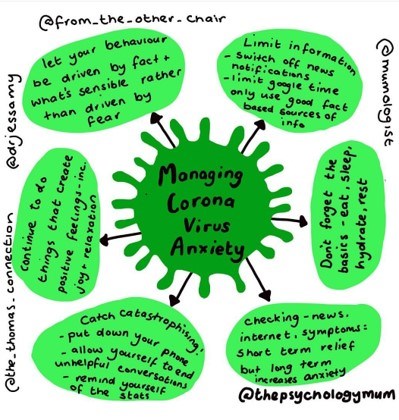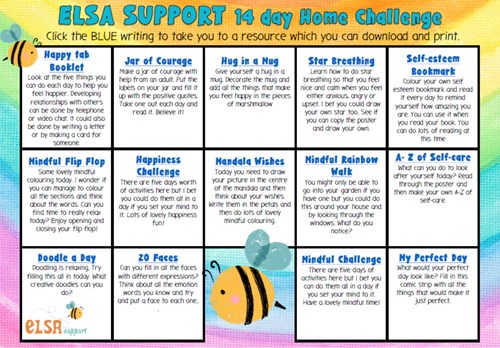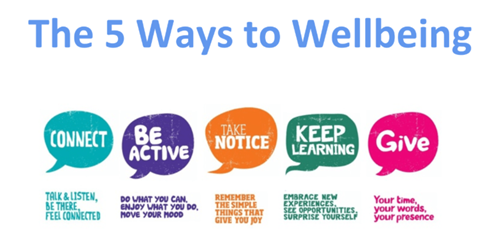Coronavirus related anxiety


Dr Anna Hooper - Clinical Psychologist and Adele Flannagan - Trainee Clinical Psychologist have pulled together some resources that you and your child/young person can use to help if you/they are struggling with coronavirus related anxiety.
ELSA 14 Day home challenge


ELSA have put together 14 days of activities for your children. Follow the links below to each daily activity which will take you to a page of the ELSA website. You can download and print the activity for your children.
The list of activities is designed for use during 14 day self isolation however the activities could help your children's well being during the school closures, and keep them occupied in a proactive and beneficial way.
Coronavirus anxiety tips
As the coronavirus spreads, more and more people are becoming anxious about what it might mean for them and their loved ones. It’s completely understandable (and normal!) to feel anxious about this emerging health crisis. As part of efforts to take the best care of body and mind, here are some tips that might help in tolerating these uncertain times.
How our brains work
When stressed, our brains want us to be able to predict and consider the worst case scenarios to help us prepare and protect ourselves. This is great when there is a way of problem solving the situation – not so great when there isn’t. Our brains are predisposed to focus on threat. We will forget the “everyday” and bring full attention to things which are scary, without taking time to really think about the facts.
For example, we might think nothing of getting in our cars everyday but be scared of spiders, even though the evidence suggests we are more likely to be at risk in a car than from a spider.
Furthermore, as a species we are not very good at tolerating uncertainty, something that in the current climate we might need to allow! Our minds want us to have explanations so when we can’t find them our brains will fill in the gaps, and if anxiety has any say these explanations will be usually based on our biggest fears.
Anxiety can snowball; we start with one worry and before we know where we are it’s grown and grown and we’re now headed for a full on catastrophe (the “what if”.. “but then what if…” scenario), even when the likelihood of each possible thing coming true may be minimal. Anxious thoughts get in the way of our minds taking in what we need to know and deciphering fact from fiction.
The uncertainty of the coronavirus is scary. And scary gets our attention! However, it might help to try to stay grounded and get the facts instead of allowing our minds to make up the information for us. Try to find a source of information which is reliable. Snippets of information from social media may represent one person’s worry and thoughts, rather than the actual risk/facts. Make sure you are informed but not overloaded – consider limiting your exposure to information. For example, by restricting where you go to find information to reputable sources (such as the NHS, Government, World Health Organisation), or by setting boundaries around how much time you will allow yourself to read/listen to the news.
We know thoughts can snowball, when you notice your mind back on the topic of coronavirus try to step back. Labelling thoughts as thoughts can help, for example instead of “I have coronavirus and I could die”, try to rephrase this “I recognise I am having the thought that I have coronavirus and I could die”. Emphasising the difference between what is reality and what is a thought can help gain perspective. We can’t stop ourselves from worrying (the example that if you are asked not to think about a penguin on ice skates, let’s notice where your mind goes!), but we can train our brains to focus on something else. Make time for worry, but also put in boundaries with how much mental space you will allow coronavirus to take. Think about what is in in your control and what is not. Worrying about coronavirus will not guarantee a better outcome, so to help you in the moment schedule some coronavirus free time where you can put your attention onto something else.
Take steps to minimise coronavirus related risk.
The advice that resonated for me was to assume you are a carrier and to put reasonable and appropriate precautions in place to prevent the risk to others. Act in a way which could minimise the risk of infection to others, rather than acting from a place of avoidance or fear of contamination yourself. Coronaviruses are spread through everyday contact, through touch, a cough, or a sneeze. If you’re sick, stay home. If you’re not sick, stay away from close contact with a person who is and engage in healthy habits when it comes to cleanliness. Listen to the advice from the medical professionals around how to practice good self-care and reduce risk of infection.
Stay connected.
We are always much better at offering advice and reassurance when it’s someone else going through a tricky time – remember our loved ones can do the same for us! They could provide a space to have your thoughts and feelings normalised and offer you some distraction or reassurance. Particularly as more and more of us are opting to self-isolate, remaining in contact with others will be even more important. You might need to get creative! Think about substitutes for face-to-face contact. If you are not able to speak with your friends or family, think about how to connect with those further afield. Suggestions could include writing a letter to a distant loved one, finding a new online group for your local community, or finding an online forum about a hobby or interest that you have.
Use your past coping skills
Think about what has helped you in the past when you have felt stressed or overwhelmed. It could be yoga, relaxation, mindfulness, trying a new recipe, talking with a friend, distracting yourself with a puzzle, making time for self-soothing (taking a nice bath for example)… the list is endless! What helps will be different from person to person – use what works for you.
Consider the 5 steps to mental wellbeing



The more you nurture your mental health, the more resilient to anxiety and stress you will enable yourself to be. Strategies for mental well-being include:
- staying connected with other people
- be physically active
- learn new skills
- give to others
- pay attention to the present moment.
You might need to adapt some of these if you are self-isolating or unable to participate with your usual activities. Some ideas include:
- trying a new exercise regime at home
- making time for a long phone call to a friend
- finding a new hobby
- practising a mindfulness exercise.
There are some great resources online that can help with activities during periods of self-isolation, why not try www.dothinkshare.com or check out our list of self-isolation activities.
Information from the media is changing day by day.
This can make times feel uncertain and the future unpredictable. Thinking too far ahead can feed those “what if...” thoughts. Breaking your day into chunks could help you to step back. Instead of thinking about the whole day, think about the “now and next”. What are you doing in this moment, and what do you plan to do in the next. Think in terms of the present and immediate future. You’ll deal with anything that comes up as you need to, but contemplating something that hasn’t happened yet can be a playground for anxious thoughts.
Self-Isolation activities list
- Clear out your wardrobe or cupboards
- Give yourself a manicure/pedicure
- Read/write a book
- Do a crossword/Sudoku/word search/colouring in
- Binge watch a must-see boxset/film series or old feel good movie
- Make a photo album - some websites/apps will send you photos for free (you just pay for postage)
- Gardening- mow the lawn, plant some flowers
- Start a blog
- Baking
- Learn a new recipe
- Learn how to knit/crochet
- Have a dance
- Exercise- home workouts, YouTube videos, yoga
- Make a travel bucket list
- Learn a language- websites/apps like Duolingo and Babbel offer some languages for free
- Do some DIY- redecorate a room, fix something
- Call a friend or family member - video calls (Skype, Whatsapp, Facetime etc)
- Play a game - card games, board games, computer games or design your own!
- Learn to play an instrument
- Bird watch, create a bird feeder www.rspb.org.uk/fun-and-learning/for-kids/games-and-activities/activities/make-a-recycled-bird-feeder
- Make jams or preserve
- Have a home picnic
- Learn to give yourself/someone else a massage
- Have a digital detox - clear you email inbox, delete old files, update your passwords
- Sort through paperwork
- Research a topic of interest
- Do a jigsaw puzzle
- Sort through photos on your phone
- Learn a magic trick
- Listen to a podcast, radio show or audiobook - websites/apps like Digital book, LibriVox and Audible have free audio books.
- Arts and crafts - websites such as www.favecrafts.com have lots of fun ideas.
- Enter a competition
- Creating a home spa - bubble bath, face masks, foot spa
- Listen to music
- Sign up to a free online class/course - try places like www.reed.co.uk/courses/free and https://www.futurelearn.com/courses
- Create a time capsule
- Design a magazine or newspaper
- Online shopping
- Spending time with pets - teach them a new trick?
- Try a science experiment (www.iflscience.com/chemistry/unfinished-20-fun-science-experiments-you-can-do-home/)
- Look through old photographs/home movies
- Write a letter to a family member/friend
- Take a virtual tour of a museum (www.travelandleisure.com/attractions/museums-galleries/museums-with-virtual-tours)
- The 75 Best Virtual Museum Tours Around the World (Art, History, Science, and Technology) https://upgradedpoints.com/best-virtual-museum-tours/
- Find things to donate to charity (once it’s safe to visit)
- Create your own cinema - make tickets, popcorn, lay down a rug
- Catch up with life admin - check insurance quotes, change your energy provider etc
Virtual School update
These resources are aimed more at helping children understand the virus and to manage anxiety around what is happening: